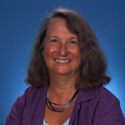ELAINE ORAN
2009 Laufer Lecture
 Senior Research Scientist
Senior Research Scientist
Naval Research Laboratory
Title: “The Laminar Flame to Turbulent Flame to Detonation Transition: Studies of Non-Kolmogorov Turbulence and Stochasticity”
Abstract:
“The transition from a propagating subsonic Laminar flame to a high-speed Turbulent flame and then to supersonic Detonation wave (the LTD transition) involves a series of often dramatic events involving changes in the nature of the reaction wave. Some of the events develop continuously whereas others appear suddenly and with little apparent warning. The LTD transition occurs in highly exothermic energetic materials, for example in hydrogen-air mixtures resulting from gas leaks at hydrogen production and storage facilities as well as in carbon-oxygen mixtures in white-dwarf stars which, after ignition, become thermonuclear supernovae. This presentation describes the properties of the LTD transition using videos made from numerical solutions of the multidimensional, unsteady, chemically reacting, Navier-Stokes equations. The discussion focuses on selected features of the flow, including: formation of a turbulent flame and the nature of the turbulence, creation of hot spots as the origins of detonations, effects of stochastic processes on our ability to make predictions, and comparisons between simulations and experimental data.
Elaine S. Oran received an A.B. degree in both Physics and Chemistry from Bryn Mawr College in 1966, an M.Ph.\ from the Department of Physics at Yale University in 1968, and a Ph.D. from the Department of Engineering and Applied Sciences at Yale University in 1972. In 1972 she joined the Plasma Physics Division at the Naval Research Laboratory. In 1978, she became part of the Laboratory for Computational Physics, where she later started the Center for Reactive Flow and Dynamical Systems.
Since 1988, Dr. Oran has held the position of Senior Scientist for Reactive Flow Physics at the Naval Research Laboratory. In this capacity, she is responsible for developing, supervising, advising on, and carrying out theoretical and numerical research on the fluid and molecular properties of complex dynamic systems. Current research topics include: chemically reactive flows, deflagrations and detonations, computational science and numerical analysis, high-performance computing and parallel architectures, shocks and shock interactions in gas and condensed phases, computational methods for rarefied gas flow, turbulence in reacting and nonreacting flows and microfluidics. Application areas include combustion and propulsion, reentry and microdynamical flows; mixing, control, and delivery in microfluidic systems; atmospheric physics; and astrophysical phenomena, particularly supernova explosions.
Dr. Oran is a fellow of the American Institute of Aeronautics and Astronautics (AIAA) and the American Physical Society (APS), and she is a member of the National Academy of Engineering. She has received a number of awards, including the Arthur S. Fleming Award, the Oppenheim Prize of the Institute of Dynamics of Energetic and Reactive Systems, the Zeldovich Gold Medal of the Combustion Institute, and the AIAA Dryden Distingiushed Lectureship in Aerospace Research. She was inducted into the Hall of Fame of Women in Technology International and received the Society of Women Engineers Achievement Award. In 2006, she was awarded the honorary degree of Docteur Honoris Causa by Ecole Centrale de Lyon and delivered the Louis Clark Vanuxem Public Lecture at Princeton University (http://www.princeton.edu/WebMedia/lectures/).
Dr. Oran has published many technical papers, written many review articles, and coauthored (with Jay P. Boris) the book, “Numerical Simulation of Reactive Flow” (Elsevier 1987; 2nd ed. Cambridge 2001). She is currently Editor-in-Chief of the AIAA Journal, Visiting Professor at Leeds University, Adjunct Professor or Aerospace Engineering at the University of Michigan, and Honorary Professor of the University of Wales. In conjunction with faculty from universities in the United States and Europe, she has guided many graduate students, primarily in aerospace engineering but also in physics, astrophysics, and physical chemistry.

